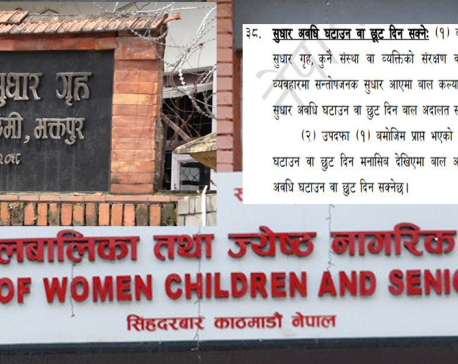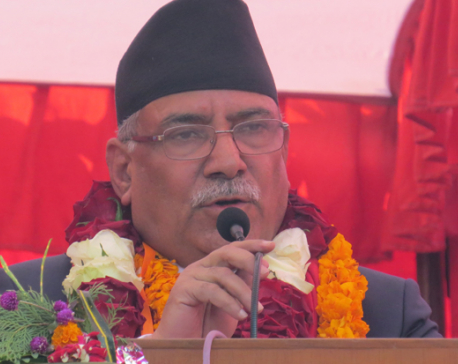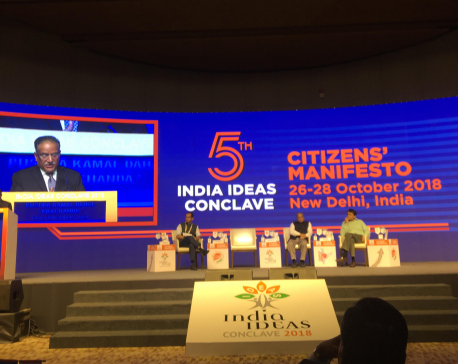
OR
Nepal Communist Party (NCP) co-chair Pushpa Kamal Dahal seems keen on granting amnesty to the perpetrators of 2015 Tikapur carnage. On Sunday, he said that the anti-constitution protest that resulted in lynchings of seven police personnel and a toddler in Kailali was a political uprising and that it should be dealt with as such. Such a remark from the head of ruling party is irresponsible and smacks of impunity. First, what happened on August 24, 2015 in Tikapur was a pure act of violence unleashed at the police personnel by the mob. The police personnel killed in that brutal lynching were apparently there to appeal the protestors for calm. But the protestors overpowered them from all sides and started to attack them with spears and whatever domestic weapons were handy. Seven police personnel and a toddler were lynched. To call such an act of horror a political event is a grave injustice to the victims. As we have been maintaining in this space, the perpetrators of this crime should be punished according to the law. This is not to mean that the police personnel who used excessive force against the protestors in anti-constitution protests in various parts of Tarai plains or any other place in 2015 should be allowed to go scot-free. They should be booked too. All those who committed atrocities during the anti-constitution protests must be brought to justice.
Failure of governments to book the persons involved in atrocities during various movements have given rise to impunity in Nepal. Often, the commissions formed to investigate those atrocities are either rendered dysfunctional or their recommendations are completely ignored. It was so with the Raymajhi Commission Report which identified the actors involved in violence during the people’s movement 2006. The state of impunity around the perpetrators who committed serious human rights violations during the Maoist conflict is the most telling example. While the victims who suffered at the hands of both the state forces and the rebels are crying for justice, the government has not been able to give direction to the protracted transitional justice process. Instead, there have been tendencies to provide amnesty to the perpetrators of violence. Nepal should guard against earning similar disrepute by giving amnesty to those involved in killings in 2015 protests.
When a country tries to justify violence by giving it a political color, it sets a dangerous precedent and helps to institutionalize impunity. Protests turn violent often times. When the security personnel and protestors fail to exercise restraint it results in chaos and deaths. It is precisely to prevent deaths in such protests that both protestors and the security personnel need to fear the consequences of violent acts. The case of Hong Kong may be an example here. Protests there have continued for over months, but there have been no casualties so far and no large scale violence and vandalism mainly because both protestors and police have exercised restraint. In Nepal, protests often end in violence and deaths because neither the security forces nor the protestors seem to exercise restraint. First condition to rooting out impunity is when the state stands firm against violence. It is unfortunate that Nepali political actors, Pushpa Kamal Dahal in this particular case, want to give political color to crimes. His Sunday’s remark sounds like a statement of impunity. None of those who committed atrocities during protests in Tarai plains—whether security forces or protestors—should be allowed to walk free. Impunity is the last thing Nepali people want.
You May Like This

Amnesty for adults! Why are children in correctional facilities not given an exemption?
KATHMANDU, Oct 6: On the occasion of Constitution Day, the President traditionally grants amnesty to prisoners, a practice that has... Read More...

Govt's key priorities are social justice, good-governance and prosperity: PM Dahal
KATHMANDU, May 5: Prime Minister Pushpa Kamal Dahal has said that his government was advancing firmly for the strengthening of... Read More...

Nepal's constitution citizens' manifesto: Chairman Dahal
KATHMANDU, Oct 26: CPN Chairman Pushpa Kamal Dahal has said Nepal's constitution is the citizens' manifesto both in term of the process... Read More...




Just In
- MoHP cautions docs working in govt hospitals not to work in private ones
- Over 400,000 tourists visited Mustang by road last year
- 19 hydropower projects to be showcased at investment summit
- Global oil and gold prices surge as Israel retaliates against Iran
- Sajha Yatayat cancels CEO appointment process for lack of candidates
- Govt padlocks Nepal Scouts’ property illegally occupied by NC lawmaker Deepak Khadka
- FWEAN meets with President Paudel to solicit support for women entrepreneurship
- Koshi provincial assembly passes resolution motion calling for special session by majority votes







_20220508065243.jpg)






Leave A Comment